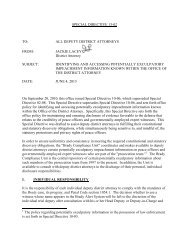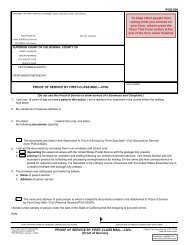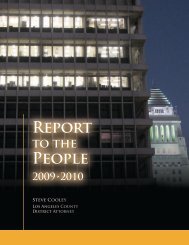LADA Investigator Written Examination Study Guide - Los Angeles ...
LADA Investigator Written Examination Study Guide - Los Angeles ...
LADA Investigator Written Examination Study Guide - Los Angeles ...
You also want an ePaper? Increase the reach of your titles
YUMPU automatically turns print PDFs into web optimized ePapers that Google loves.
STUDY GUIDE:<br />
SENIOR INVESTIGATOR, D.A. AND INVESTIGATOR, D.A.<br />
38. C. An error is found in part C of the sentence. The sentence should read, Though<br />
the procedure applies to all departments, the Fire Department has modified it. In<br />
part C, “department” should be capitalized to reflect that a specific department is<br />
referenced.<br />
39. B. An error is found in part B of the sentence. The sentence should read We on the<br />
neighborhood committee were opposed to the building of the new supermarket. In<br />
part B, “was” is the incorrect verb form.<br />
40. C. In the example, They’re is the correct compound expression of they are, and<br />
can is the correct verb tense. The sentence should read They’re going to approve<br />
the project when they can obtain funding.<br />
41. B. The sentence should read Detailed information regarding open positions is<br />
available on our website. In the sentence, “are” is the incorrect verb form for the<br />
singular subject of “information.”<br />
42. D best expresses the common thought. Choices “A,” “B,” and “C” confusingly<br />
separate the subject of the sentence (i.e., “beginners and experienced<br />
professionals who want a review of the basics”).<br />
43. A best expresses the common thought. In choice “B,” the verb (i.e., “will be<br />
closed”) is separated by a prepositional phrase (i.e., “on Monday”). Choice “C”<br />
does not follow the generally accepted sentence construction of the subject being<br />
followed by the verb, and instead places the verb (i.e., “will be closed”) after the<br />
subject (i.e., “our office”). In choice “D,” the verb (i.e., “will be closed”) is separated<br />
by two prepositional phrases (i.e., “in celebration” and “of the national holiday”).<br />
44. D best represents the common thought. Choice “A” is a run-on sentence; “B”<br />
contains improper sentence structure and unnecessary punctuation; and “C” is<br />
overly verbose.<br />
45. A best represents the common thought. Choice "B" is choppy; "C" has<br />
unnecessary commas (i.e., "...all nouns, in the salutation, when writing..."); and "D"<br />
is improperly structured.<br />
46. B best expresses the common thought. In choices “A” and “C,” the adjective “all” is<br />
too far way from the noun that it modifies (i.e., “men, women, and children”), thus<br />
splitting up the subject of the sentence, “all men, women, and children,” and<br />
compromising clarity. Choice “D” is awkward in that it does not follow the generally<br />
accepted sentence construction of the subject being followed by the verb, and<br />
instead places the verb (i.e., “are fully considered”) before the subject (i.e., “all<br />
men, women, and children”).<br />
Page 29 of 31



![[PROPOSED] SPECIAL DIRECTIVE 13-01](https://img.yumpu.com/38563244/1/190x245/proposed-special-directive-13-01.jpg?quality=85)


